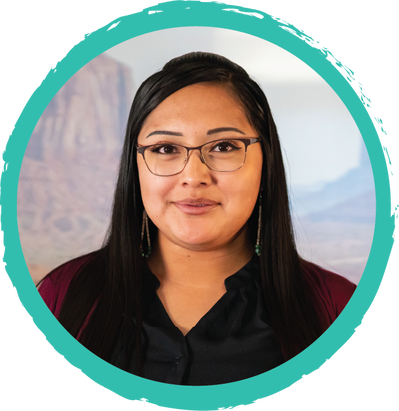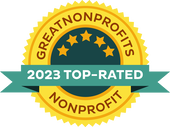From the Ground: Recentering, Homes and Deeper HealingRed Feather Program Coordinator Elizabeth Freeman speaks on the power of re-centering, the need to celebrate success, incorporating education into everything we do, and when a home assessment is so much more than a home assessment. 'Since we’ve grown our Direct Solutions program, which provides a limited budget for home repair materials for families across both Hopi and Navajo, we’ve seen a huge increase in the number of calls and applications. It’s been exciting but it’s also been a lot! Remembering the big picture is essential for me when I get overwhelmed with the amount of demand we are facing, or the amount of calls that come in during the day. People are facing a lot, and this is our way of doing something immediately, of meeting immediate need. The growing of the Direct Solutions program is intended to be that, and in so many ways it is succeeding. 'Acknowledging and celebrating that re-centers me. 'Despite the struggles, we are doing so much good work. I mean, we are really doing SO MUCH, reaching so many homes. And sometimes, in the constant drive to do more, we don’t always take the time to stop and spotlight and celebrate what we are doing, which is so important. Because we are reaching a lot of people. When you are as dedicated as we are to trying to help and to serve, it can be overwhelming to come in in the mornings and just see ‘Oh, I have 30 missed calls and 50 new emails’ but the power is in realizing that these are all people we are reaching and people that will be helped. 'I’m a big believer in stopping to recognize accomplishments and celebrate them. The truth is that Red Feather has grown a lot and is doing amazing work, so let’s acknowledge and get joy out of that too, while also recognizing that of course there will always be more work to do. 'I don’t think anyone should undersell what they’ve managed to overcome or succeed at, and that goes for both our employees and those that we serve. People just need to hear “You are doing fantastic!” and this can start a positive cycle of encouragement and self-belief. As we are focusing on meeting these immediate physical needs in the home through our Direct Solutions program, there’s this other side too of just making sure people feel seen and acknowledged. I think this is something we all need. 'When we are in the field a lot, we have to focus on the negative aspects. When you are doing home assessments, you have to look for what is wrong in the home in order to find what is most needed. So this sort of negative focus has to be there, and especially when you are working in communities with endemic poverty and centuries of oppression and trauma, sometimes it’s easy to see only that, to stay in the negative, to just be in the thought process of “how did people get to this point?” 'But there is such a powerful mindset switch we can do too. Like yes, when we are doing home assessments we focus on the negative, but there is also space for the positive in our interactions. 'This is where our education programs come in, because there is a space for change and hope and possibility when people have life tools and not just home fixes. Knowledge cannot be taken away from you. There are so many types of education too, you don’t have to have a degree to gain knowledge. 'At Red Feather, what we want to do is also provide a pathway to the power of knowing that you can take care of yourself. I think that there are many layers to things, and yes its great to have your home fixed, to have heating, to get these needs met, but then there is the deeper emotional level, also the emotional healing, that can come from a feeling of "I can take care of myself." 'This is how I see our programs coming together. We all have a hierarchy of needs. With the Direct Solutions program, and also our HHESI and other home repair programs, we target that base layer on Maslow's pyramid. We all need a home, we need somewhere to sleep, somewhere safe to be, to be warm. Of course we all need that. 'But I don’t want to just leave someone with a healthy home kit and call it a day. We are trying to leave people with something that they can use, that they can pass on to the next generation, that can have a longer-lasting impact. 'I mean, look, we are trying to address this major, age-old housing crisis on the Hopi and Navajo reservation. That’s what Red Feather is here for. But how can we move from just immediate crisis response to preparation, to prevention? I think that incorporating education, financial literacy, all of it, into everything we do is key. 'It is my intention and hope that people pass this all on to their kids, that we can all become better examples, that the next generation has something more to work with. 'My hope is that I can give people the tools, the resources, so that when tough situations come up they have something to throw at that, to address that. We are working on this as a key aspect of our programs at Red Feather all the time. 'People’s actions reflect their mindset and their current emotional state. There’s always a reason for why people are in the situation that they’re in. We all express our needs in different ways. We don’t always know what people have gone through, but we are all human. Having one’s needs be ignored is a kind of neglect. At its most basic what we do at Red Feather is try to see people’s needs, to make sure that people know we are seeing them. That they’ve been noticed, that someone cares, that they’ve been heard. 'It might seem simple, like we just provided someone with a smoke alarm, fixed their window, gave them a safer stove, but in this context of deep historical and cultural trauma, what I think this can also give, or at least I hope this can also give, is a sense that at least someone saw me today, cared about the situation I was in. At least, if no one else did today, Red Feather saw that need and tried to do something, cared, was there to be present.'
Comments are closed.
|
Archives
June 2023
Categories
All
|
|
Change your mind at any time by clicking 'unsubscribe' in any email you receive or by contacting us at [email protected]. We will treat your information with respect. For more information about our privacy practices please see our privacy policy. By clicking above, you agree that we may process your information in accordance with these terms.
In compliance with all GDPR requirements- you can request any data you’ve shared with Red Feather to be permanently deleted from our records by contacting us at [email protected]. |
WORKING WITH HOPI AND DINÉ
COMMUNITIES FOR HEALTHIER AND SAFER HOMES.
LAND ACKNOWLEDGEMENT: The Red Feather program office sits in an area that is sacred to over 14 local tribes, including the Diné, Hopi, Havasupai, Hualapai, Zuni, Pueblo, and Kaibab-Paiute peoples. Some of these nations are represented among the Red Feather staff, and some not. We humbly acknowledge this area’s Indigenous nations, original stewards and Native descendants who will forever know this place as home. We share a responsibility to recognize and acknowledge the people, cultures, and histories that make up our community. *Adapted from the Flagstaff City Council land acknowledgement developed by the Indigenous Commission

If you have a disability that limits your ability to access our facilities, please contact us so we can arrange for an alternative meeting location. See our ADA access plan here.
This institution is an equal opportunity provider. |






 RSS Feed
RSS Feed

